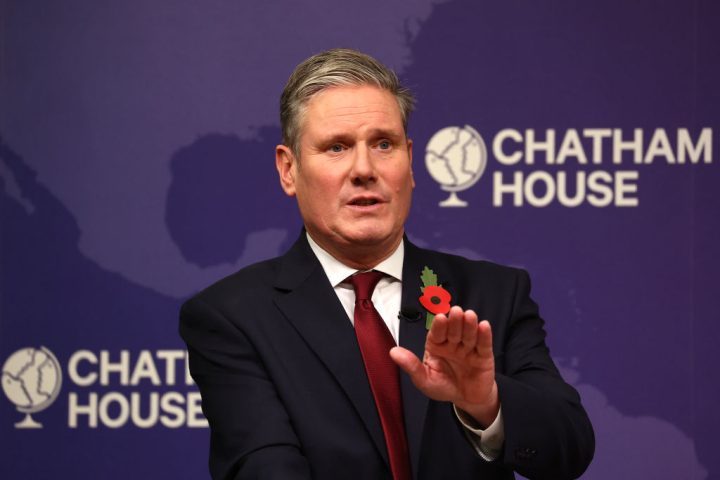Keir Starmer has tried to get back on the front foot today over his party’s position on Israel and Palestine. Following growing discontent in Labour over Starmer’s refusal to call for a ceasefire, the party’s leader used an impromptu speech at Chatham House to insist that he would not bow to demands to change his mind.
Despite more than a fifth of his MPs calling for one, Starmer argued that ‘a ceasefire now is not the right way forward’ as it would stop Israel from dismantling Hamas and could embolden the terrorist group. Starmer said a ceasefire would ‘freeze’ the situation as it is – which would be a bad outcome as it could allow Hamas to continue what it is doing now which ‘cannot be the right answer’:
Starmer argued that the Labour party is united in its concern and care for those impacted by the conflict
While I understand calls for a ceasefire, at this stage I do not believe that is the correct position now, for two reasons. One, because a ceasefire always freezes any conflict in the state where it currently lies. And as we speak, that would leave Hamas with the infrastructure and the capability to carry out the sort of attack we saw on 7 October. Attacks that are still ongoing. Hostages who should be released – still held. Hamas would be emboldened and start preparing for future violence immediately.
And it is this context which explains my second reason, which is that our current calls for pauses in the fighting for clear and specific humanitarian purposes, and which must start immediately is right in practice as well as principle. In fact it is – at this moment– the only credible approach that has any chance of achieving what we all want to see in Gaza – the urgent alleviation of Palestinian suffering.
While Starmer was effectively saying he will not change his mind, he used the speech to try to sound sympathetic to those who want him to make concessions. He emphasised several times that he understood why some in his party were calling for a ceasefire, even if the implication from his comments is that these MPs (including 13 Labour frontbenchers) are misguided.
Starmer tried to find ways to unite his party going forward. Following the backlash he faced for his interview with LBC at Labour conference, where he appeared to suggest that Israel could defend itself by cutting off water and electricity, he said today:
‘The right to self-defence is fundamental but it is not a blank cheque. The supply of basic utilities like water, medicines, electricity and yes, fuel to civilians in Gaza cannot be blocked by Israel.’
Starmer is trying a balancing act of talking tough on Israel while not actually changing position. As for a long term solution to the conflict, Starmer said his party would fight for ‘the recognition of a Palestinian state as part of a negotiated, just and lasting peace’.
In the Q&A session that followed the speech, Starmer claimed his party was unified despite the differing messages. He argued that the Labour party is united in its concern and care for those impacted by the conflict. Given the very different messages coming from members of his front bench, unity seems a stretch.
What about collective responsibility? Starmer was asked several times whether those in his front bench team taking a different position from him would be disciplined for going against the party line. Starmer responded by repeatedly saying that he takes the duty of collective responsibility ‘extremely seriously’, yet refrained from suggesting that any action would be taken.
The speech today was intended to show Starmer remains in control when it comes to the Labour position on the conflict, despite growing pressure from his side. However, the fact he felt the need to give a speech announcing nothing had changed points to the problem he faces. For as long as Starmer allows members of his top team to give conflicting messages on the issue of Israel and Palestine, he won’t seem fully in control.







Comments